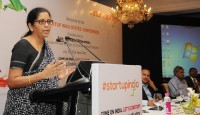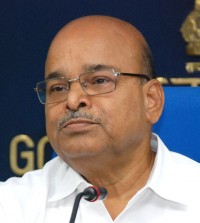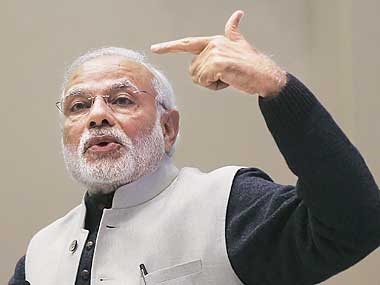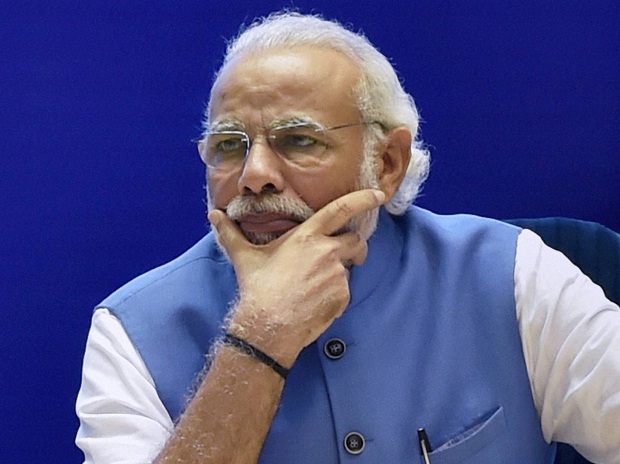Speech by the Hon’ble Commerce and Industry Minister, Smt. Nirmala Sitharaman
Good morning everyone!
It gives me immense pleasure to be amongst this esteemed gathering of entrepreneurs, innovators, thought leaders and change catalysts. We are here today to find avenues to establish and foster relationships between all stakeholders of the Startup ecosystem.
Startup India initiative is designed to foster innovation, create jobs and facilitate investment. Government is committed to make this initiative a scalable reality and to provide an environment for our Startups to thrive in.
India is buzzing with entrepreneurial activity like never before and is at the forefront of an entrepreneurial revolution. India has been pegged at 3rd place behind USA and UK in terms of the number of Startups. Close to 4,400 technology startups exist in India and the number is expected to reach 12,000+ by 2020, driven by a young and diverse entrepreneurial ecosystem. India is the world’s youngest startup nation with 72% founders less than 35 years and remarkably innovative ventures are making a mark in India. These numbers are indicative of the positive entrepreneurial temperament of India. This is not only today’s reality but is indeed, a fantastic opportunity.
Startups are the next big economic force in India. Through the Start-up India initiative, we want to ensure that the momentum is accelerated. We are determined to make it a startup revolution and to ensure that every aspiring entrepreneur is able to achieve his/her potential. I would like to take this opportunity to compliment our government, partners and all stakeholders for making appreciable progress in implementation of the Action Plan for Startup India and also encourage them to stay determined to the goal of making India a Startup destination.
We have recognised the need to handhold and guide startups particularly in their early growth stage. To meet this, we have operationalised the Startup India Hub on 1st April 2016 to resolve queries and to provide handholding support to Startups. The hub has been able to resolve more than 13,500 queries received from Startups through telephone, email and Twitter.
We have also recognized the need of incentivizing innovative startups because we are aware that they are the engines of growth. The Finance Act, 2016 has made provision for Startups to get income tax exemption for 3 years in a block of 5 years, if they are incorporated between 1st April 2016 and 31st March 2019. Tax exemption on investments above Fair Market Value have also been introduced for investments made in Startups. To avail these benefits one must get a Certificate of Eligibility from the Inter-Ministerial Board of DIPP. The Inter Ministerial Board examines the eligibility of recognized Startups, which are incorporated after April 1, 2016, for tax benefits. Startups that have not been able to obtain recognition are being guided and handheld through the process by the Startup hub.
Funding is perhaps the most important input because from day one any entrepreneur will need funds to develop his ideas and give it a concrete shape. A ‘fund of funds’ of Rs.10,000 crores for Startups has been established which is managed by SIDBI. The fund will invest in SEBI registered Alternative Investment Funds (AIFs) which, in turn, will invest in Startups. Thus, this fund acts as an enabler to attract private capital in the form of equity, quasi-equity, soft loans and other risk capital for Startups.
Startups need to concentrate on the idea they are working on and not worry about compliances under various Acts. Startups working in areas covered under the list of 36 “white” category industries have been exempted from all the applicable compliances under 3 Environment Laws viz. the Water (Prevention & Control of Pollution) Act, 1974; the Water (Prevention & Control of Pollution) Cess (Amendment) Act, 2003 and the Air (Prevention & Control of Pollution) Act, 1981.
Startups also need to be assisted during that stage when they are scaling up and trying to venture into new markets. To that end, we have made provision for relaxed norms on prior experience and turnover for public procurement for micro and small enterprises in the Procurement Policy of Ministry of MSME.
More than 250 incubators have been recognized by Government of India to provide recommendation to startups. In order to augment the existing list of incubators, a module to recognize incubators has been launched. This shall enable incubators to obtain recognition from Government of India, allowing them to issue recommendation letters to Startups. 7 proposals for Research Parks, 16 proposals for TBIs and 13 proposals for Startup centers have been recommended by the National Expert Advisory Committee (NEAC) formed by MHRD. These proposals shall be implemented in the current financial year.
The guidelines for harnessing private sector expertise to set up incubators, annual grand challenge for innovative solutions to problems posed by industry and Government departments, annual grand challenge for incubators and establishment of tinkering labs have been formulated and published on Startup India website. DIPP has written to top 50 companies requesting them to support the initiative under their CSR activities by setting up new incubators or scale up existing incubators in collaboration with educational institutes.
Letter of recommendation by incubators to ascertain the innovativeness of a product, service or process is an important requirement for startups to obtain recognition. In response to the feedback on the difficulties faced by startups in obtaining such recommendation a cap has been put on the maximum fee that can be charged by the incubators for providing Letter of Recommendation to Startups.
Innovation is the core of a Startup and protection of Intellectual property is imperative. A panel of facilitators has been constituted for providing assistance and support in filing applications for Intellectual Property Rights (IPR), wherein, DIPP would bear the facilitation cost. In order to avail IPR-related benefits, rebate in fee upto 80% and free of cost facilitation in filing IPR applications, a Startup would now be required to obtain only a Certificate of Recognition from DIPP and would not be required to be examined by the Inter-Ministerial Board, as was being done earlier.
DIPP has requested State Governments and administration of Union Territories to set up a Startup Hub as well as incubators to help Startups during various stages of their development. I would like to congratulate Telangana and Gujarat who have set up T-Hub and iCreate.
These new reforms, I believe, will lead to a paradigm shift in the way investors – nationally and globally will look at India’s business environment. I foresee a bright future for the country where our economic growth is driven by technological innovation, entrepreneurship and economic diversification.
We wish to see entrepreneurs from the remotest part of India to come forth and showcase the potential of their ideas, women populace to take stage and drive change, India to become a nation of job creators and not job seekers. And all of you hold the potential to make this dream a truth.
This is a government that believes in constantly taking the feedback from people. Towards that end, I will be meeting:
1. Meeting with Startups Founders – Fixed for 28th of July, 2016
2. Meeting with incubators and accelerators
3.Meeting with educational institutions having incubators or entrepreneurship cells
4. Meeting with angel investors and angel networks
5.Meeting with VCs and Private Equity firms
6. Meeting with the heads of all industry associations dealing with Startup India
7. Meeting with journalists who have been dedicatedly covering the evolution of Startup movement in India













